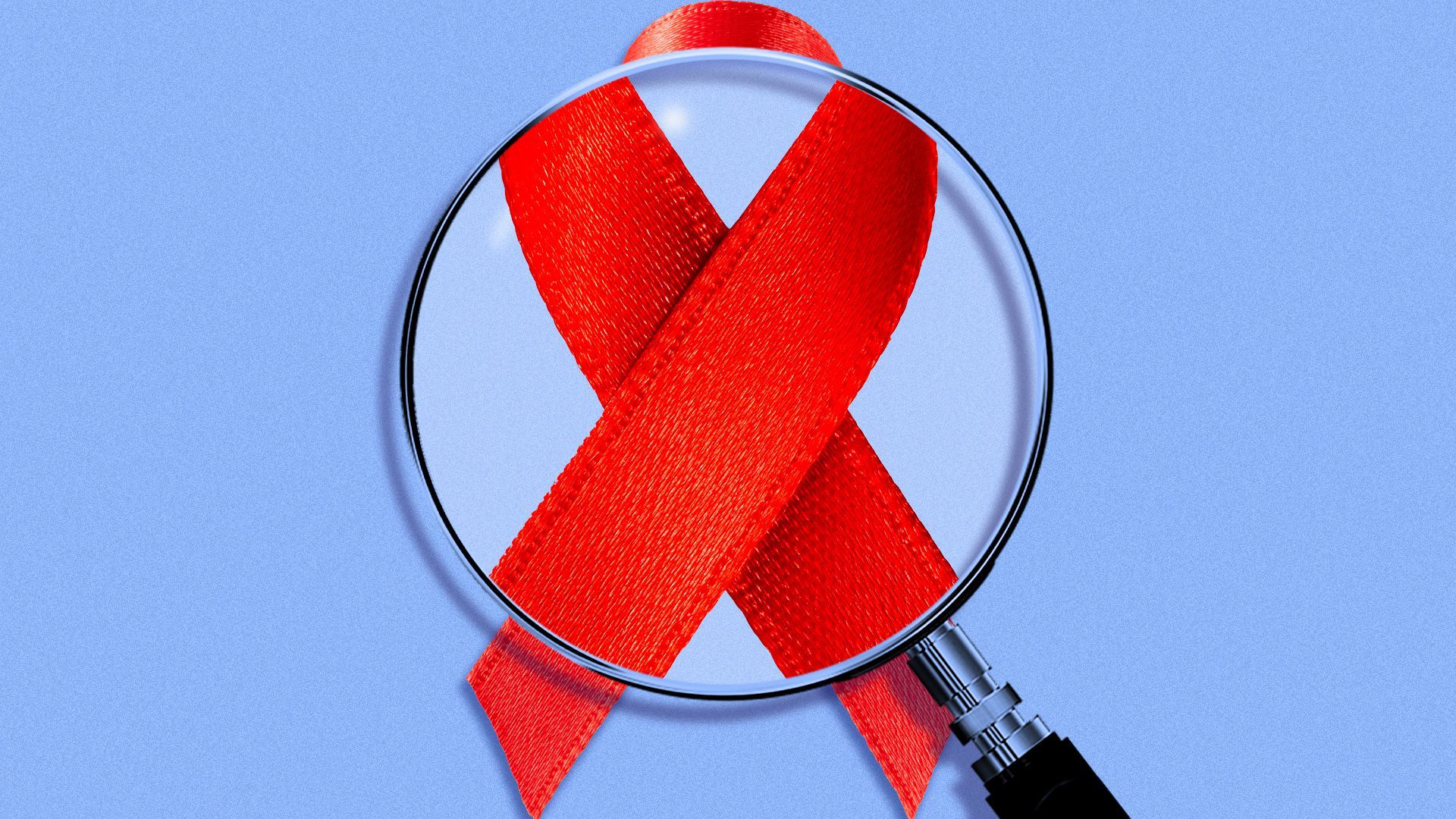| |
| |
| |
| Presented By PhRMA |
| |
| Axios Vitals |
| By Tina Reed ·Feb 04, 2022 |
| 😎 Happy Friday, Vitals readers. Today's newsletter is 970 words or a 4-minute read. Mark your calendars: You can join Axios virtually at our inaugural What's Next Summit on April 5. Register here to attend livestream sessions with discussions on trends that will revolutionize our future. |
| |
| |
| 1 big thing: Omicron infections may not ward off future cases |
 |
|
| Illustration: Aïda Amer/Axios |
| |
| The extent to which Omicron's rapid spread leaves the world better off in its fight against COVID depends on a few big questions, including how long infection-induced immunity actually lasts, Axios' Caitlin Owens writes. Why it matters: Vaccinations and infections at high enough levels can form an immunity wall against the future spread of the virus. - But if Omicron infections ultimately don't contribute much to this wall, that leaves much of the world still vulnerable.
The big picture: When COVID-19 first emerged, no one had any immune protection to it. In the two years since, that's changed drastically. - It'd be a potential silver living if the Omicron variant's soaring global caseloads raised the level of global immunity to the point that the virus isn't able to easily spread.
- But for that to happen, Omicron infections would have to translate into significant additional protection against future infection — which isn't a given.
What they're saying: "It appears that the immunity conferred by infection from Omicron isn't that durable," former FDA commissioner and Pfizer board member Scott Gottlieb told CNBC. - "Since it's a less severe infection, it's not inducing as robust of an antibody response and an antibody-induced immunity," he said.
Zoom in: Recently posted preprint papers — which have not yet been peer-reviewed — have offered some clues. - One, for example, concluded that "Omicron-induced immunity may not be sufficient to prevent infection from another, more pathogenic variant should it emerge in the future."
The bottom line: While natural immunity has value, Omicron appears to be proving once again that vaccines are still the most effective tool. - And billions of people around the world have yet to receive their primary vaccine doses, which remain significantly effective at preventing severe disease — even against Omicron.
Share this story. |
    |
| |
| |
| 2. HIV disparities persist |
 |
|
| Illustration: Sarah Grillo/Axios |
| |
| Black Americans are diagnosed with HIV at a rate that's nearly four times higher than the rate for all other racial groups combined, according to new data released by the CDC. By the numbers: Black adults made up a disproportionately high number (43%) of newly diagnosed cases of HIV and AIDS, at a rate of 39.2 per 100,000 people in 2018, the data shows. - More than half (52%) of those Black adults diagnosed lived in segregated communities with higher levels of social vulnerability.
What they're saying: "While there is no simple solution to equity, our nation must finally tear down the wall of factors — systemic racism, homophobia, transphobia, HIV-related stigma, and other ingrained barriers — that still obstructs these tools against HIV and COVID-19 from equitably reaching the people who could benefit from them," Demetre Daskalakis, director of CDC's HIV Prevention Program said in a statement. |
    |
| |
| |
| 3. Staffing industry under fire |
| International nurses filed suit against an American staffing agency, accusing it of "trafficking" in a case that could reverberate across U.S. health care, Bloomberg Business Week reports. Why it matters: Workforce shortages have been an ongoing issue even before the pandemic, but the business practices of the staffing agencies providing additional manpower in hospitals is under fire. - Bloomberg focuses on a lawsuit filed against a company called Health Carousel by a nurse brought from the Philippines to work in Pennsylvania.
The details: The nurse said she wasn't getting paid for many of the hours she was working, but ultimately had to pay the company $20,000 in order to quit without a threat of a lawsuit. - Health Carousel denied the nurse's claims and said it was "vigorously defending the good work" it does, per Bloomberg.
- But this is an example of hundreds of health care employees that have been sued by staffing agencies for trying to quit, Bloomberg reports.
Between the lines: The staffing industry has faced a closer examination of its business practices during the pandemic. This week, a hearing on Capitol Hill examined a separate issue of price "gouging" by large staffing companies that place nurses in hospitals. |
    |
| |
| |
| A message from PhRMA |
| Middlemen are pocketing your discounts |
| |
 |
| |
| Government price setting policies won't stop insurers and other middlemen from shifting medicine costs to you. Get involved: Use your voice to stand against dangerous health care proposals like government price setting. Get more details. |
| |
| |
| 4. The next cancer frontier |
 |
|
| Illustration: Rebecca Zisser/Axios |
| |
| Cancer treatments that modify a patient's immune cells to attack cancer cells are being re-engineered to try to treat more cancers in more people, Axios' Alison Snyder writes. Why it matters: CAR-T immunotherapies have been successful in treating certain types of blood cancers in some people. But the treatments still struggle against solid tumors, which make up about 90% of cancers in adults. - "Solid tumors are the next frontier," says J. Joseph Melenhorst, an immunologist at the University of Pennsylvania who develops CAR-T therapies.
What's new: Scientists are experimenting with designing new CAR-T cells and therapies to find, attack and continuously surveil solid tumor cancers. - T cells are being engineered to target multiple antigens on a cancer in an effort to make it more difficult for cancer cells to escape and return.
- But most of the antigen targets on solid tumors are also on types of healthy cells people can't live without.
The bottom line: "Immunotherapy has promise for solid tumors, but there is a need for a lot more research," said Carl June, an immunologist and oncologist at the University of Pennsylvania who led the early development of CAR-T therapy. |
    |
| |
| |
| 5. Catch up quick |
- He once seemed like a shoo-in. Now Robert Califf's nomination for FDA commissioner is increasingly uncertain. (New York Times)
- People in states with high medical debt and lower rates of health insurance coverage are more likely to try to raise money on crowdfunding websites — and less likely to succeed. (University of Washington)
- A new study has raised the possibility chewing sugar-free gum may have a modest impact on reducing premature births. (Associated Press)
|
    |
| |
| |
| 6. Dog of the week |
 |
|
| Theodora. Photo: Meg Rediess |
| |
| Meet Theodora, better known as Teddy, a 1-year-old Shichon who lives in Wells, Maine, with her humans Meg Rediess and Tony LaPenna. - Teddy loves the snow, which seems like an especially good thing this week after the Northeast got walloped.
- "We are retired and Teddy saves our sanity daily. Our PCP referred to her as a 'life extender!'" Rediess wrote. If only they wrote prescriptions to get dogs...
|
    |
| |
| |
| A message from PhRMA |
| Patients need affordable medicines |
| |
 |
| |
| Government price setting threatens patient access to medicines and innovation. Instead, let's cap out-of-pocket costs and stop middlemen from pocketing discounts. Learn more about how these proposals have potentially devastating consequences for patients. |
| |
| 📬 Did someone forward this email to you? Here's how to subscribe. |
 | Bring the strength of Smart Brevity® to your team — more effective communications, powered by Axios HQ. | | |
No comments